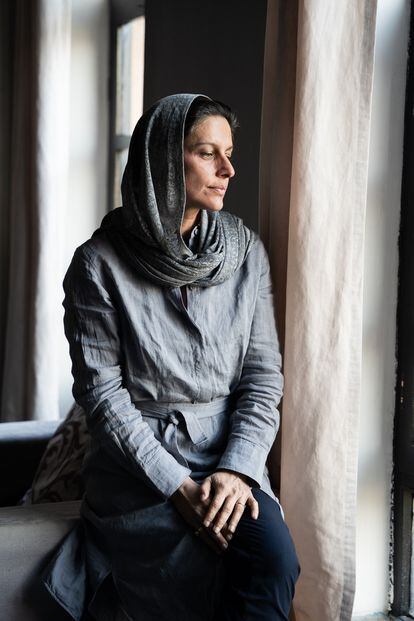“Salam wa alaikum
.
Welcome to the Roshani (to enlighten, in Dari) program.
You can call us and share your ideas about women's rights and violence against women.
My name is Assira."
Such a natural way to start a radio program that, in any corner of the world, it would not be extraordinary.
But this is Afghanistan, the Taliban are back in power and women's rights, far from being in an ideal situation, are more threatened than ever.
The radio studio is silent during the live broadcast, only interrupted by the voice of the two presenters who, today, in their program, talk about misogyny.
Assira, 32 years old and a religious adviser, and Saba Chaman, 24 years old and coordinator of Radio Begum, are in charge of showing their faces, or rather, their voices, before the listeners.
In 45 minutes, they will try to refute the false beliefs of those who try to justify violence against women based on the Koran.
Saba Chaman, radio coordinator, and Assira, religious adviser, during a program on misogyny on Radio Begum, Kabul, Afghanistan. Thibault Lefebure
Hamida Aman, founder of Radio Begum, is Swiss-Afghan and works mainly on fundraising for the station in Afghanistan, a country in bankruptcy. Thibault Lefebure
Sahar Maqsoodi (third from the right), 19, works as a teacher in the educational space of the radio. Thibault Lefebure
In the Radio Begum office, the women employees prepare and edit programmes. Thibault Lefebure
This generation of young people born in Post-Lebanon Afghanistan after 2001 hopes to change the beliefs of a patriarchal society. Thibault Lefebure
The radio offers 30-minute lessons, in the morning in Dari and in the afternoon in Pashto.Thibault Lefebure
After the ban on the schooling of girls from the seventh school year, the goal of the women's team in Begum is to educate other women. Thibault Lefebure
Young women take great risks by going to the radio station.
To date, the Taliban authorities tolerate Radio Begum's activity, but all employees, trainees and students, as well as their families, are under surveillance. Thibault Lefebure
The Taliban allow Radio Begum to continue broadcasting, but with certain restrictions: they do not broadcast American songs or pop music. Thibault Lefebure
A few minutes later, a call comes in from a listener.
— Every time a man hits his wife, he hides behind the fact that Islam says: "If my wife does not accept my words, I have the right to hit her."
— No, this is completely false — answers Chaman.
People should see where in Islam it says you should beat your wife.
They shouldn't treat their women badly.
Domestic violence grows since children are small, inside the house.
When they grow up and see domestic violence, it becomes a kind of tradition that is reproduced generation after generation.
Chaman has had to take on a major challenge: to continue coordinating Radio Begum after the return to power of the Taliban last August.
“I have worked with women and men before, but this is my first time working with an all-female team.
It has been stressful at times, especially after the regime change, but it has also been fun”, says the young woman after the program, still sitting in the radio studio.
Chaman, a student in the last semester of Business Administration, started working at Radio Begum in March 2021, just when it was founded.
The launch date was not accidental: March 8, International Women's Day.
A declaration of intentions.
Just a couple of months later, an explosion took place near a Kabul girls' school, killing more than 80 people, most of them schoolgirls, as they walked out of class.
No one claimed responsibility for the attack, which was decisive in leading the Radio Begum team to focus their efforts on education.
an anonymous medium
Before that attack, the seed that gave birth to radio was already planted.
At the beginning of 2020, "the Taliban and US negotiators were beginning to reach some agreement, and I was very worried," recalls Hamida Aman, 47, founder and director of Radio Begum.
Lying on the sofa in her office, upstairs from the radio station, she recalls: “The role of women was not mentioned during the discussions.
She knew that something would change, and that having the Taliban in government would bring about changes in Afghan society, especially for women”.
Aman, raised in Switzerland, where her family moved after the Soviet invasion of Afghanistan, had always wanted to return to her country.
She did it after the collapse of the twin towers, in 2001, and in the following two decades, a period of relative openness, she developed several audiovisual initiatives there.
In 2020, Ella Aman knew that she had to act again in the face of the countdown to the abyss into which Afghanistan seemed to be sinking.
“For me it was quite normal to think of a radio because I have worked in the media for more than 20 years.
I thought that would be the best response to regime change because it's just sound and voice.
It keeps the listener anonymous, but also the presenters and journalists,” she recounts.
Hamida Aman, founder of Radio Begum, is Swiss-Afghan and works primarily on fundraising for the station in a bankrupt country. Thibault Lefebure
In the main room, the group of student girls practicing at the station fills the various computers.
They edit the already recorded programs and prepare the following ones.
They are young, they make jokes with each other, they have fun and, at the same time, they are preparing for a demanding professional future, to say the least.
Most have passed the exam to enter the university and have just started the first year, which they combine with practice.
For a few moments, they put aside the laughter between them before the questions about the job prospects.
“We are facing an uncertain future in Afghanistan,” says Sahar Maqsoodi, 19, a radio reporter since its inception.
“I was dying to work in the media.
I had no prior knowledge, I have learned everything here, ”she acknowledges.
She hosts the morning show, she teaches the radio's educational space, and sometimes she goes out to produce short reports on women to post on social media.
Maqsoodi is part of the generation of young people who was born in Post-Lebanon Afghanistan, after 2001. He is young and has clear ideas.
“We want to change people's mentality.
Many people do not have access to the internet or television, especially in the provinces.
So for the poorest, the radio is the cheapest option to learn and acquire knowledge”, explains the young woman.
For the poorest people, radio is the cheapest option to learn and acquire knowledge
Sahar Maqsoodi (19 years old), reporter for Radio Begum
During the first year of life of the radio, they have managed to develop several initiatives.
Currently they have
online
school programs , especially to accompany girls who cannot go to school – under the Taliban regime, girls are denied access to secondary education.
In Radio Begum they find a space to continue training.
“We have tools to make teaching lighter in the morning or at night, like audiobooks, book reviews, poetry...” says Maqsoodi.
Broadcasting from Kabul, the radio can also be heard in Logar, Ghazni, Parwan, Baghlan and Bamiyan provinces.
In addition, radio stations in Faryab and Kunduz broadcast their most popular programs, although the most ambitious goal of the radio station is to be able to broadcast throughout Afghanistan.
Neither american music nor pop
Getting to continue broadcasting after the return to power of the Taliban has been possible only with a well-planned strategy from before.
Having overcome the initial
shock
of August, the radio workers maintain that the change of regime has not affected them much, since they consider themselves an educational platform and they let the new government know so.
“We told them the same thing I'm telling you now, that the goal of this women's team is to educate other women.
That we are not a political tool nor do we want to raise any political discussion”, declares Maqsoodi.
In the Radio Begum office, the women employees prepare and edit programmes. Thibault Lefebure
Surprisingly, the Taliban agreed to keep them going, at least until now.
But they put some conditions.
“We have had to adjust the programs and, of course, the music.
We no longer broadcast American songs, or pop, or Shakira or singers of this style”, acknowledges the founder, Aman.
“On the entertainment side, we've also had to tone it down.
Normally, in the programs in the morning or at night, the listeners would call us to make some jokes, or request songs to dedicate to their friends or family.
Or we would have conversations and laugh, just to relax for a while.
We can't do that anymore because the Taliban don't want women to interact too much with men, even on the phone, in an informal way.
It has to be more distant,” she explains.
The Taliban do not want women to interact too much with men, even on the phone, in an informal way.
It has to be more distant
Hamida Aman, founder of Radio Begum
Surviving the Taliban… and the economy
If keeping the project alive with the Taliban in power is not enough of a challenge, they still face a bigger one.
How to survive financially.
"I am constantly looking for funds," explains the founder of the station.
"The country collapsed and we don't see how to get income."
They receive some donations, but they are not enough to consolidate the project.
And the economic sanctions by Western countries against Afghanistan affect them directly.
“Another challenge we face is how to get money into the country,” she laments.
For now, they do it with cash.
"The banking system is broken and it is killing Afghan society and economy," she stresses.
Taliban, financing… The challenges are enormous, but, after more than 40 years of war, is there any remedy to move the country forward?
Aman is clear: “The problem in this country is the lack of education.
More than 80% of the population is illiterate.
This is also what gets people into so much trouble, because they have little knowledge and education.
The key is to give access to schools and education to everyone”.
It is difficult, acknowledges Aman, to have a long-term vision of the project: “This is a very unstable and unpredictable country.
I have been working in Afghanistan for 20 years and we got used to working under problems and challenges all the time.
It is not a normal place to have an organization”, he reflects.
When asked how the world can act in the face of the uncertain future that awaits Afghanistan, Chaman, the radio's coordinator, replies: “You don't need to be in contact with the government of our country to show your support.
Support can be humanitarian, for example by developing a program to help women access education.
For those of you who have the possibility to help, financially or morally, I think it will help a lot.
To all of you who read this report, I ask you to do what you can to help Afghan women maintain their resilience.”
You can follow PLANETA FUTURO on
,
and
, and subscribe
to our 'newsletter'
here
.


/cloudfront-eu-central-1.images.arcpublishing.com/prisa/HMRECCDZWJEQPGFAAW7JVGNWEY.jpg)





/cloudfront-eu-central-1.images.arcpublishing.com/prisa/4QBBQZRJOFAWLKWBHY4E4XP5XE.jpg)
